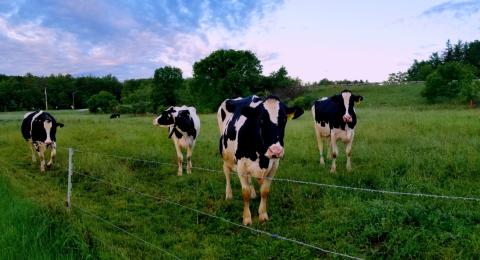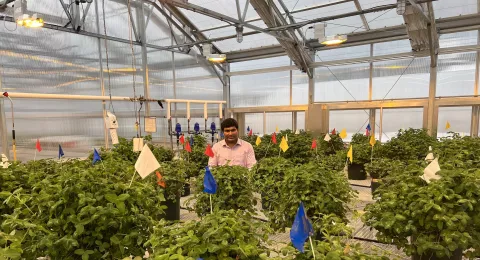Why pursue a Ph.D. in agricultural sciences at UNH?
A Ph.D. in agricultural sciences will help you advance your career in an agriculture-related field, whether you are working in agricultural production, agribusiness, policy areas in government or nonprofit sectors, education and/or research. As a graduate student in the department of agriculture, nutrition and food systems, you will part of an interdisciplinary department focusing on the farm to fork wellness continuum and a holistic approach to solving problems. You will also develop independent and team research experience and graduate prepared to pursue a wide range of careers.
Program highlights
UNH is among the nation’s highest-performing research universities, having earned a Carnegie Classification R1. Our research portfolio brings in more than $110 million in competitive external funding each year. Federal and state funding is available for research on diverse aspects of sustainable agriculture, foods and agricultural sciences. You’ll have the opportunity to partner with state and regional growers and producers and collaborate with leading researchers worldwide. As a graduate student at UNH, you’ll have the opportunity to work in several top-notch teaching and research facilities, including the New Hampshire Agricultural Experiment Station, one of the university’s largest research organizations.
Potential career areas
- Agribusiness
- Commercial plant/animal production
- Research
- Private consulting
- Education and Extension
- Farming
- Government/regulatory
- Policy making
- Nonprofit sector
Curriculum & Requirements
The Doctor of Philosophy (Ph.D.) in Agricultural Sciences graduate program offers a flexible course of study that provides education and research experience plant and animal agriculture, food systems, and related fields. Graduate students are engaged in an interdisciplinary department focusing on the farm to fork wellness continuum and an integrated approach to solving problems. Students will also develop independent and team research experience.
Our faculty offer education and research opportunities in the diverse components of food systems, and plant and animal agricultural systems including breeding and genetics, physiology, environmental interactions, protected agriculture, organismal health, agroecology, and pathology. Beyond the classroom and the lab, students will hone communication skills that are essential for professional scientists through teaching, extension, and outreach opportunities with stakeholders and constituents.
With a Ph.D. in Agricultural Sciences, students are prepared to pursue careers in college teaching and research positions in industry and government. Students may work in plant and animal agriculture, food production and distribution systems, teaching, public service, research in federal, state, nonprofit, private organizations, or related fields.
The Ph.D. program is thesis-based, with the expectation of generating and publishing substantial new knowledge in the field of interest.
Doctor of Philosophy (Ph.D.) graduate students work with their advisor and Doctoral Guidance Committee to plan a program of study including the required core courses, competencies, and develop a research proposal. To complete the degree, students must complete a research proposal, pass a qualifying exam, conduct dissertation research, and complete and defend a dissertation.
Guidance and Dissertation Committees: During the first semester, the student and advisor jointly select members of a guidance committee. A nomination form must be sent to the graduate school to officially appoint the committee membership. The Guidance Committee consists of 5 members and is responsible for approving the proposal and oversees the qualifying examination. Once the student has advanced to candidacy, the Doctoral Dissertation Committee is formed. The Dissertation Committee is responsible for administering the dissertation exam.
Dissertation Proposal and Defense: All Ph.D. students are required to develop a formally approved research proposal typically by the end of the third semester and no later than the fourth semester. Proposals are approved by the dissertation committee and the major advisor. In addition to the written proposal, students are expected to present a proposal defense presentation. This proposal should consist of the following:
- comprehensive review of the literature related to the student’s research topic.
- statement of need/justification.
- research goal with a list of research objectives with stated hypotheses that address the major research questions.
- plan of work describing the experimental approaches or methods to be used in answering the thesis questions.
- Expected outcomes and potential pitfalls for each objective.
- Timeline for completion of the work.
- preliminary research where appropriate.
Candidacy: Following approval of the research proposal and completion of coursework, doctoral students should advance to candidacy. Candidacy is reached after passing a formal qualifying examination that assesses both broad basic knowledge of the student’s field, and topics central to the research project. The purpose of the exam is to measure of the student’s likelihood of successfully completing a doctoral program. The qualifying exam comprises written and oral components.
- Written exam: Student choose three areas of specialization in consultation with their Doctoral Guidance Committee. The advisor solicits questions from Committee members and administers the exam. Once completed, Committee members evaluate the responses. The student is expected to demonstrate competence in each of the chosen areas, reflected in clear, concise, well-organized synthetic essays. The exam may be “closed book” or “open book” at the discretion of the advisor.
- Oral exam: An oral exam is conducted by the Doctoral Guidance Committee and chaired by the advisor. The student should demonstrate mastery of fundamental concepts in the designated areas of specialization, draw upon a broad spectrum of information to answer theoretical and practical questions. There may be focus on any area that was deemed weak in the written exam.
When the student has passed both parts of the qualifying exam, the advisor will inform the Graduate School and recommend that the student be advanced to candidacy in the Ph.D. degree program.
Dissertation and Oral Defense: All students must complete a dissertation reporting original research. After completion of the research, the candidate must provide a copy of the dissertation to the Doctoral Dissertation committee at least two weeks prior to the final oral examination. The final thesis defense consists of two parts: an oral presentation of the research in a public seminar, and an oral defense of the dissertation conducted by the Doctoral Dissertation Committee. Final approval of the dissertation will be determined by a majority vote of the committee.
Number of Credits Required: There is no specific credit requirement for the Ph.D., though students must take the required core courses and fulfill the competences outlined below. Up to 8 credits of graduate credit from another institution may be transferred, provided the credits were not counted toward another degree, and the course grade was a B or higher. Petitions requesting transfer credit must be supported by the advisor and graduate committee and approved by the UNH Graduate School.
1. Core Course Requirements:
| Code | Title | Credits |
|---|---|---|
| ANFS 901 | Introduction to Agriculture, Nutrition, and Food Systems Graduate Studies 1 | 1 |
| ANFS 997 | Agriculture, Nutrition, and Food Systems Seminar 2 | 1 |
| ANFS 999 | Doctoral Dissertation Research 3 | 0 |
- 1
To be taken at the earliest opportunity, typically in the initial fall semester of the program.
- 2
All students are required to register and participate for a minimum of 3 credits.
- 3
All students are required to register and participate at least twice, and must be taken after candidacy.
2. Competency Requirements: In addition to the core required courses, students will be expected to demonstrate competency in areas of experimental design and analysis, and in scientific writing and communication. Students must take at least one course from each competency. The competencies may be fulfilled by courses chosen in consultation with the advisor and committee. Depending on the student, one or both of these competency requirements may have been fulfilled through other course work or professional experience as approved by the committee and ANFS graduate coordinator.
| Code | Title | Credits |
|---|---|---|
| Communication Competency | ||
| Select at least one course from the following: | ||
BIOL 902 | Writing and Publishing Science | |
NR 905 | Grant Writing | |
BIOL 950 | Scientific Communication | |
| Experimental Design and Analysis Competency | ||
| Select at least one course from the following: | ||
ANFS 933 | Design, Analysis, and Interpretation of Experiments | |
SOC 902 | Sociological Methods II: Research Design | |
3. Electives: Each student, in consultation with their graduate committee, will define one or more areas of informal specialization, and will take additional courses appropriate for their area(s) of specialization.
4. Additional Information:
- All students in the Agricultural Sciences Ph.D. Program are expected to present their research in ANFS departmental seminar at least three times (including the defense seminar). Students are also encouraged to present at professional conferences and acquire teaching and/or mentoring experience.
Annual Evaluation: The annual evaluation of graduate students ensures that students receive the mentorship they deserve and are making progress toward completion of their degrees. The annual evaluation of graduate students consists of a collaborative effort between faculty adviser and student to:
- Complete a self-assessment;
- Present a professional quality CV suitable for awards, job applications, and internships;
- Produce a narrative of service or other activities not captured on a CV;
- Develop annual goals.
Program Learning Outcomes
Students graduating with a Ph.D. in Agricultural Sciences will meet objectives in the following areas:
Discipline specific knowledge
- Identify and explain discipline specific research methods
- Build knowledge and understanding in key areas of agricultural sciences including food systems, and animal and plant-based agricultural production systems
Research design and analysis
- Identify the strengths and weaknesses of study designs utilized in agriculture or food systems research
- Apply appropriate research design to answer a question
- Identify and apply appropriate statistical methods to analyze and interpret research results
Scientific method
- Independently develop, defend, and execute a research idea to advance knowledge in the student’s specific field of study
Critical thinking
- Ability to collect and critically evaluate information from the primary research literature to expand knowledge of agricultural and food systems
- Draw conclusions from the literature and make recommendations based on an understanding of the system, scientific evidence, related factors, and desired outcomes
- Develop skills to critically evaluate and analyze their research data
Communication
- Communicate effectively in writing through the development of an argument supported by evidence
- Communicate effectively in oral formats when addressing project-specific research and complex agriculture and food related issues
- Contribute written works to the scientific community in the form of peer-reviewed publications and presentation at scientific conferences
Professionalism
- Conduct research in an ethical manner
- Deliver professional oral and written communications
- Demonstrate collaboration and leadership skills
Deadlines
Applications must be completed by the following deadlines in order to be reviewed for admission:
- Fall: Jan. 15 (priority*), Aug. 1 (final) *Applications completed by Jan. 15 will be given priority consideration for admission and financial support. Applications completed after Jan. 15 will be considered based on openings and funding.
- Spring: Oct. 15 (final)
- Summer: N/A
- Special: N/A
Application fee: $65
Campus: Durham
New England Regional: MA RI
Accelerated Masters Eligible: No
New Hampshire Residents
Students claiming in-state residency must also submit a Proof of Residence Form. This form is not required to complete your application, but you will need to submit it after you are offered admission, or you will not be able to register for classes.
Transcripts
If you attended UNH or Granite State College (GSC) after September 1, 1991, and have indicated so on your online application, we will retrieve your transcript internally; this includes UNH-Durham, UNH-Manchester, UNH Non-Degree work and GSC.
If you did not attend UNH, or attended prior to September 1, 1991, then you must upload a copy (PDF) of your transcript in the application form. International transcripts must be translated into English.
If admitted, you must then request an official transcript be sent directly to our office from the Registrar's Office of each college/university attended. We accept transcripts both electronically and in hard copy:
- Electronic Transcripts: Please have your institution send the transcript directly to grad.school@unh.edu. Please note that we can only accept copies sent directly from the institution.
- Paper Transcripts: Please send hard copies of transcripts to: UNH Graduate School, Thompson Hall- 105 Main Street, Durham, NH 03824. You may request transcripts be sent to us directly from the institution or you may send them yourself as long as they remain sealed in the original university envelope.
Transcripts from all previous post-secondary institutions must be submitted and applicants must disclose any previous academic or disciplinary sanctions that resulted in their temporary or permanent separation from a previous post-secondary institution. If it is found that previous academic or disciplinary separations were not disclosed, applicants may face denial and admitted students may face dismissal from their academic program.
Letters of recommendation: 3 required
Recommendation letters submitted by relatives or friends, as well as letters older than one year, will not be accepted.
Personal Statement/Essay Questions
Prepare a brief but careful statement regarding:
- Reasons you wish to do graduate work in this field, including your immediate and long-range objectives.
- Your specific research or professional interest and experiences in this field.
Important Notes
Applicants should visit the Agricultural Sciences program website and review the list of faculty in their area of interest. The applicant should contact potential faculty advisors to discuss their interests and determine whether the faculty member(s) may be willing and able to serve as the student’s advisor before applying to the program. See the Agricultural Sciences Faculty List for a current list of faculty.
All applicants are encouraged to contact programs directly to discuss program specific application questions.
International Applicants
Prospective international students are required to submit TOEFL, IELTS, or equivalent examination scores. English Language Exams may be waived if English is your first language. If you wish to request a waiver, then please visit our Test Scores webpage for more information.





































